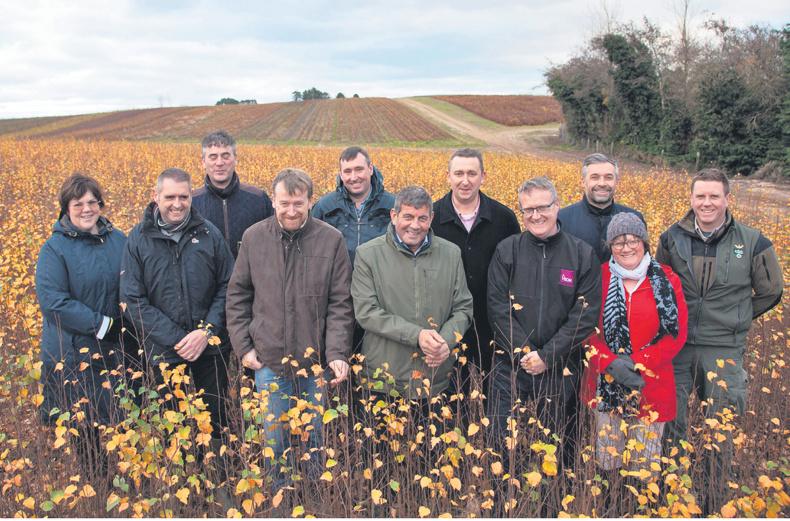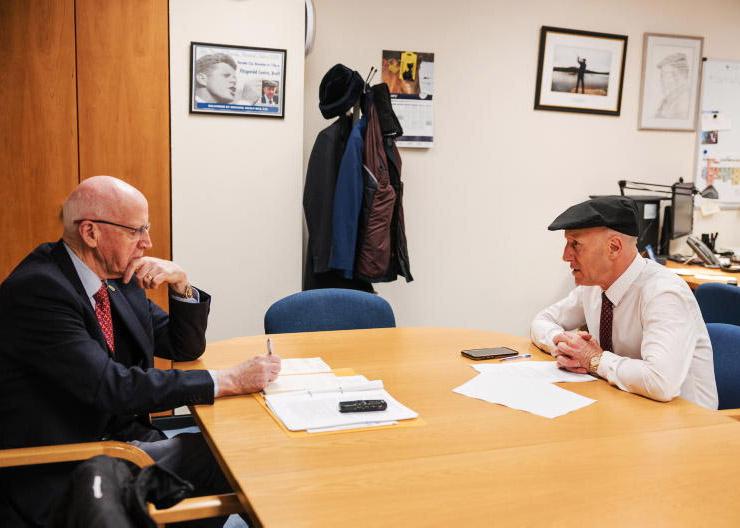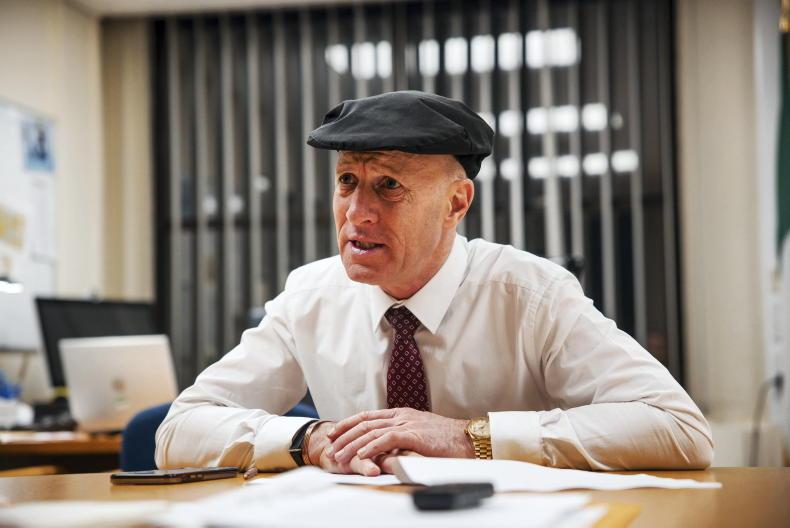The 2018-19 planting season was launched by minister of state Andrew Doyle last Monday in Ballymurn Nursery, Co Wexford. Minister Doyle said a number of initiatives during the year have laid the groundwork for a viable planting programme, which “would place specific focus on broadleaf and native species”.
Native woodlands
Minister Doyle pointed to the improved grant and premium rates for native species during the mid-term review (MTR). The establishment grant in the Native Woodland Scheme is now €6,220, with up to €680/ha annual tax free premium payments for 15 years (Table 1). “These significant increases will promote greater species and habitat diversity and will help the Department to deliver on our commitment to achieve an annual broadleaf planting target of 30%,” he said.
Stable income
Daragh Little of Veon Ltd said that despite the drop in annual planting in recent years, there were reasons to be cautiously optimistic. “Although funding has reduced, the €105m budget allocation is still sufficient to support a strong afforestation programme,” he said. “This has been a challenging year for farming beginning with heavy rain and snow earlier in the year followed by drought conditions, while Brexit continues to cast a shadow. In this uncertain climate, forestry offers an additional stable income for farmers who plant some of their holdings.” When asked if the minister’s target of 30% broadleaves is too ambitious, John O’Reilly of Green Belt said the sector had surpassed this level of planting until the outbreak of ash dieback.
“Achieving this target requires innovative thinking and the revision of the Native Woodland Scheme (NWS) framework last April has provided a fresh impetus to native tree planting,” he claimed. “The introduction of Scenario 5, which allows planting of some modified peat and peaty podzols, will help in achieving the 30% target. He maintained objective vegetation analysis has the potential to increase planting in Grant and Premium Category (GPC) 3 sites. “GPC3 is the favoured grant category of forestry companies and farmers who wish to plant some of their holdings,” he said.
“Vegetation analysis is a key indicator of site fertility and species suitability and an important element in good silviculture,” claimed Gerry Murphy, president of the Society of Irish Foresters. “Sustainable timber production is a key element in silviculture but not the only one. The term silviculture also includes non-wood forest management objectives including wildlife and water protection, recreation and landscape enhancement. The current forestry programme should facilitate a species mix that is compatible with the society’s multipurpose forestry objective”.
Nursery supply
Increasing broadleaf planting will put pressure on the nursery sector but Teige Ryan said None so Hardy Nurseries has sufficient supply to meet their customers’ needs. “Our nursery dispatch figures since the introduction of the MTR show broadleaves running at 40% of all plants delivered to afforestation sites,” he said. “We are committed to growing as much stock as possible from Irish seed which is determined each year by the amount of reproductive seed cropped by the parent trees. Thankfully 2016 and 2017 proved good mast years for native oak seed, with our staff collecting 12t of acorns which will produce approximately 1,200,000 seedlings. To secure the supply of quality plants into the future, the nursery plans to make significant investment in upgrading and extending the existing irrigation systems in our Donishall and Ballymurn nurseries.”
John Kavanagh, nursery manager, outlined the work carried out in the company’s broadleaved tree improvement programme to Minister Doyle. “This comprises the indoor native birch seed orchard and the outdoor sycamore orchard,” he said. “While the nursery places strong emphasis on native species, it also promotes the planting of naturalised non-native species such as sycamore and beech while commercial species such as Sitka and Norway spruce, Scots pine and other conifers are the core productive species.”
Funding for drought-affected
plantations
Forestry companies and forest owners welcomed the recent Department decision to suspend the requirement to have a minimum of 90% survival rates in new plantations due to drought conditions during the year. However, forestry companies, forestry consultants and forest owners have urged the Department to introduce a Reconstitution Scheme to cover the cost of purchasing plants and paying contractors to carry out replanting.
In response, the Department has issued the following statement: “The minister is currently giving consideration to a Reconstitution Scheme for the 2018 drought, but this must also be approved by the Minister for Public Expenditure and Reform.” While the Department acknowledged that the “outcome is not certain and we cannot say at this stage whether there will be a Reconstitution Scheme”, the statement clarified the position should the scheme be approved: “The submission of a Form 2A and subsequent filling in of the trees lost due to drought will not disadvantage the applicant from participating in any drought Reconstitution Scheme that may be introduced.”
Co Clare seminar on timber sale
A seminar on harvesting and selling timber will be held in the Auburn Lodge Hotel, Ennis, Co Clare on Thursday 29 November beginning at 7.45pm. The event is aimed at farmer and other landowners with forests at the production stage, either thinning or clearfell. Organised by Euroforest Ireland, the event will include presentations on felling licence application, thinning, clearfelling, harvesting, markets – domestic and export – forest road grants and reforestation. The event is free but pre-booking is recommended (contact Brian Fitzgerald, 086 1426 695).
The 2018-19 planting season was launched by minister of state Andrew Doyle last Monday in Ballymurn Nursery, Co Wexford. Minister Doyle said a number of initiatives during the year have laid the groundwork for a viable planting programme, which “would place specific focus on broadleaf and native species”.
Native woodlands
Minister Doyle pointed to the improved grant and premium rates for native species during the mid-term review (MTR). The establishment grant in the Native Woodland Scheme is now €6,220, with up to €680/ha annual tax free premium payments for 15 years (Table 1). “These significant increases will promote greater species and habitat diversity and will help the Department to deliver on our commitment to achieve an annual broadleaf planting target of 30%,” he said.
Stable income
Daragh Little of Veon Ltd said that despite the drop in annual planting in recent years, there were reasons to be cautiously optimistic. “Although funding has reduced, the €105m budget allocation is still sufficient to support a strong afforestation programme,” he said. “This has been a challenging year for farming beginning with heavy rain and snow earlier in the year followed by drought conditions, while Brexit continues to cast a shadow. In this uncertain climate, forestry offers an additional stable income for farmers who plant some of their holdings.” When asked if the minister’s target of 30% broadleaves is too ambitious, John O’Reilly of Green Belt said the sector had surpassed this level of planting until the outbreak of ash dieback.
“Achieving this target requires innovative thinking and the revision of the Native Woodland Scheme (NWS) framework last April has provided a fresh impetus to native tree planting,” he claimed. “The introduction of Scenario 5, which allows planting of some modified peat and peaty podzols, will help in achieving the 30% target. He maintained objective vegetation analysis has the potential to increase planting in Grant and Premium Category (GPC) 3 sites. “GPC3 is the favoured grant category of forestry companies and farmers who wish to plant some of their holdings,” he said.
“Vegetation analysis is a key indicator of site fertility and species suitability and an important element in good silviculture,” claimed Gerry Murphy, president of the Society of Irish Foresters. “Sustainable timber production is a key element in silviculture but not the only one. The term silviculture also includes non-wood forest management objectives including wildlife and water protection, recreation and landscape enhancement. The current forestry programme should facilitate a species mix that is compatible with the society’s multipurpose forestry objective”.
Nursery supply
Increasing broadleaf planting will put pressure on the nursery sector but Teige Ryan said None so Hardy Nurseries has sufficient supply to meet their customers’ needs. “Our nursery dispatch figures since the introduction of the MTR show broadleaves running at 40% of all plants delivered to afforestation sites,” he said. “We are committed to growing as much stock as possible from Irish seed which is determined each year by the amount of reproductive seed cropped by the parent trees. Thankfully 2016 and 2017 proved good mast years for native oak seed, with our staff collecting 12t of acorns which will produce approximately 1,200,000 seedlings. To secure the supply of quality plants into the future, the nursery plans to make significant investment in upgrading and extending the existing irrigation systems in our Donishall and Ballymurn nurseries.”
John Kavanagh, nursery manager, outlined the work carried out in the company’s broadleaved tree improvement programme to Minister Doyle. “This comprises the indoor native birch seed orchard and the outdoor sycamore orchard,” he said. “While the nursery places strong emphasis on native species, it also promotes the planting of naturalised non-native species such as sycamore and beech while commercial species such as Sitka and Norway spruce, Scots pine and other conifers are the core productive species.”
Funding for drought-affected
plantations
Forestry companies and forest owners welcomed the recent Department decision to suspend the requirement to have a minimum of 90% survival rates in new plantations due to drought conditions during the year. However, forestry companies, forestry consultants and forest owners have urged the Department to introduce a Reconstitution Scheme to cover the cost of purchasing plants and paying contractors to carry out replanting.
In response, the Department has issued the following statement: “The minister is currently giving consideration to a Reconstitution Scheme for the 2018 drought, but this must also be approved by the Minister for Public Expenditure and Reform.” While the Department acknowledged that the “outcome is not certain and we cannot say at this stage whether there will be a Reconstitution Scheme”, the statement clarified the position should the scheme be approved: “The submission of a Form 2A and subsequent filling in of the trees lost due to drought will not disadvantage the applicant from participating in any drought Reconstitution Scheme that may be introduced.”
Co Clare seminar on timber sale
A seminar on harvesting and selling timber will be held in the Auburn Lodge Hotel, Ennis, Co Clare on Thursday 29 November beginning at 7.45pm. The event is aimed at farmer and other landowners with forests at the production stage, either thinning or clearfell. Organised by Euroforest Ireland, the event will include presentations on felling licence application, thinning, clearfelling, harvesting, markets – domestic and export – forest road grants and reforestation. The event is free but pre-booking is recommended (contact Brian Fitzgerald, 086 1426 695).










SHARING OPTIONS